Entries tagged as china
Related tags
almaty alps asia asia2013 berlin border bus coach erlian kazakhstan khorgas koktobe moscow mountains petropavl shymbulak snow train transsiberian travel warsaw yining amusementpark beijing cinderella copyright disney disneyland fake freesoftware shijingshan stepmania trip2011 aviation azerbaijan baikal belarus capsulehotel caspian ccp censorship childrensday chinghai climatechange dam dunhuang ecology erenhot ferry flying greatfirewall guangzhou haikou hainan hohhot hongkong hostel hotel irkutsk journey kualalumpur language laos lenin listwjanka malaysia metro miradormansion mongolia poland portbaikal publictransport pyramid qwerty rain rainforest russia sanya seat61 suprememaster terracottawarriors thailand tiananmen ticket tram transport transsib travelling typhoon ulaanbaatar ulan-ude ulanude urumqi vegan vegetarian visa waterpower weather windenergy xian xinjiang yanoda yekaterinburg zamyn-uud zensur arcade architecture astana baiterek boluo boten casino coffee computerhistory copycat ghosttown hallstatt huizhou khanshatyry luoyang magistral migrationcard migrationpolice museum northwestchina retro retrogames tankodrom babelfish chinese english googletranslate mandarin russian translation universaltranslator 129a 1mai 23c3 24c3 27c3 a100 abgeordnetenhaus akongress akw allianz anarchiekongress antiatom atheismus atomkraft autobahn bahnhof belene bild brandenburg bundestagunited buskampagne bz ccc cellular compiz creativecommons dataretention datenschutz demonstration dose elephantsdream energie energietisch energiewende freeculture freedomnotfear freifunk freiheitstattangst frequencies frequency fsfe gott gsm informationsfreiheit itu jugendumweltbewegung jukss kamera kameraüberwachung kernkraft klima klimaschutz klimawandel kohle kohlekraft kongress königswusterhausen kyoto lessig linux mcplanet mobilephones moleculeman musik ökologie ökostrom openbsc openbts openstreetmap osm osmocombb papst peterschaar piratenpartei polizeigewalt preise privacy privatsphäre ratzinger re-publica re-publica09 religion rp09 rwe science security sony springer strom stromnetz tagebaue taz theory thermen topberlin treptow tuberlin überwachung ubuntu umwelt umweltschutz unserwasser urgewald verkehr videoüberwachung volksbegehren vorratsdatenspeicherung wahl wasser wg wiki windowsxp wiretapping wirklimaretter wos wos4 youtube zimmer epr freedomofspeech gentoo nuclear politics sortirdunucleaire cement climate decarbonization industry steel 68 aacs abmahnung alecempire aliens art banksy barrierefrei berneconvention bittorrent bitv blueray brigittezypries buch bücher bundestag cedric chaosradio corruptibles cpdl culturalflatrate culture di drm easterhegg ebook epetition eu eucopyrightdirective evrimsen fanart fanfiction filesharing film freizeitpark funkerspuk gema gemavermutung geodaten graffiti gutenberg gvl hacker hddvd hiddenfrontier html ifpi illegalart iromance jankroemer journalismus justizministerium kinderlieder kopierschutz kriegderwelten kts kultur laterne laternenumzug licenses lug markenrecht metis movies mpaa musikindustrie musikpiraten mysmartgrid negativland netradio nocopy patent patente penguinbooks petition piratbyrån piratebay politik presse pressefreiheit publicdomain radio radiopolitik raubdruck raubkopie remix rsa rsaoaep rsapss sanktmartin savenetradio sciencefiction spiritlevel startrek tagesschau thepiratebay tomcruise trips tuxmas tuxmas07 usa usbstick verwertungsgesellschaft vgmusikeditionen vgwort vlc w3c warez webradio wipo wizo altparty antinuclear cablemodem d-link demoscene efficiency eletricity environment finland helsinki kabeldeutschland loviisa o2 router stromverbrauch cacert camera canon cryptography csrf email etymologie gadgets gammu gnokii gphoto josm journalist media merkaartor mobile moodle nokia openssl ptp rc2 s9y serendipity smime ssl time websecurity writing xss 3d 3ddrucker adobe ati backnang base64 bash beryl bios blob bonn bufferoverflow chdk chemnitz chromium cinelerra clt code codecs compizfusion composite compression console css cve ddwrt debian desktop developingworld digitalcamera driver dvd eltorito evince exe ffmpeg firefox firmware france freewvs freiegesellschaft froscon froscon2007 fsf gaia games gargoyle ghost gimp glibc gnome google googleearth graphics grub hardware heartbleed homebrew ibm ico icons icoutils iso ixus karlsruhe kde kpdf laptop lenovo license lpi lpic lspci lsusb memdisk messe microsoft movie nancy nessus nouveau nvidia okular olpc openexpo opengl opensourceexpo openvas pciids pdf phoronix php poppler rapidprototyping rar realmedia realvideo redhat reprap reverseengineering rmll rv30 rv40 script sfd shellshock siegburg simcity society softwarefreedomday sqlinjection sumatrapdf sunras syslinux talk thesource theunarchiver thinkpad unar usbids video videoediting vulnerability web wii wiibrew windows windowsrefund wrestool xorg acceptableads adblock adblockplus deutschewelle gentechnik mobilegeeks reklame werbung diplomathesis simple thesis upgoerfive words crookedforest forest gryfino nature places augsburg augsburgerallgemeine bnn kaisersbach oberboihingen press schwäbischestaglatt sexismus spiegel tomorrow zeitung bundesrat cybercrime hacktools blackhat defcon lasvegas retrogaming internetzensur netzneutralität zensursulaTuesday, January 7. 2014
Boten - a chinese casino ghost town in Laos
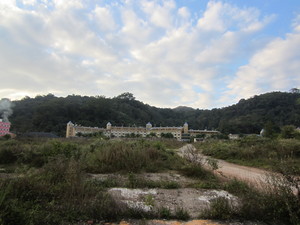
This hotel still takes customers, although there probably aren't many
Right behind the border in Laos is the small town Boten. There's a quite interesting story behind this place. A couple of years ago, this was a place of casinos for chinese gamblers. In China itself casinos are forbidden, so this gained quite some popularity. A couple of luxury Hotels and other facilities for the chinese gamblers emerged. However, some conflicts were arising. The casinos sometimes held chinese gamblers unable to pay their gambling debt as hostages. Chinese authorities were unhappy with this and pressured the laotian authorities to shut the place down, which finally happened in 2011.
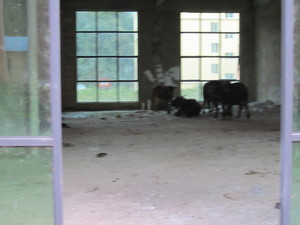
In this former hotel only cows sleep these days
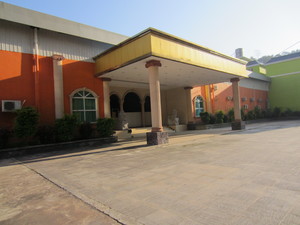
A Casino - empty today.
It was definitely one of the more interesting places on my trip.
Pictures from Boten
Saturday, December 21. 2013
Hallstatt in China
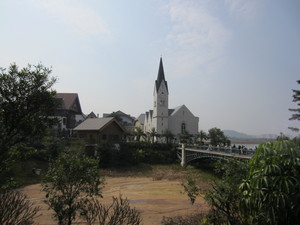
Hallstatt in China's Guangdong province
It was a bit tricky to get there. I found only limited information online. The place is near Luoyang, which is part of an area called Boluo, near the town Huizhou. Getting to Huizhou was mostly hassle-free, there are many trains every day from Guangzhou and it takes about two hours. How to come to Luoyang/Boluo is another story. I had two bus numbers I found in some Internet forums, but I couldn't find them at the train station. So either the information was wrong or the buses with that numbers are departing from another place in Huizhou. I also had some GPS coordinates I found online of the copycat Hallstatt, but it turned out later that they were not very accurate.
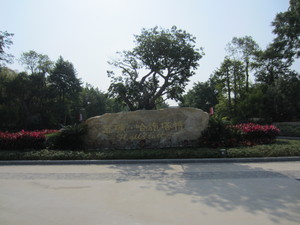
The entrance
What is interesting to know is that this place isn't primarily a tourist destination. It's a housing development, people are supposed to live here. However, I think nobody lives here yet, because except for the town's center, everything is still in construction. There are a number of similar projects in China. Tianducheng in eastern China, which rebuilts parts of Paris, has gotten quite a lot of media attention lately as an example for the Chinese housing bubble. Almost nobody lives there and it's mostly a ghost town. As the chinese Hallstatt isn't yet ready to house anyone, the future will tell if it'll fall to the same fate.
There were a number of things that made this place weird. The most obvious thing: You usually don't see tropical plants in an austrian town. I have no idea why they had a (fake/nonworking) red, british-style phone booth. Maybe for a chinese Britain isn't that far from Austria after all. Although this place isn't primarily meant as a tourist destination, it certainly attracts a lot of them. It was quite crowded. I haven't seen anyone who looked like being from Austria though.
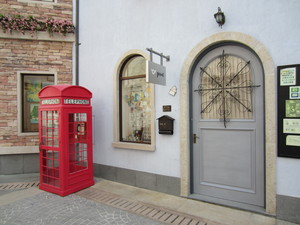
British style fake phone booth
I'd like to finish with a quick comment. When reading western news commenting about this case and others, they're often quick in condemning this kind of "copycat" culture. I think one needs to be careful with that. The importance of the "original" is something that is deeply rooted in cultural norms and traditions. Sticking to the original is something that's probably more important in European cultures than in China. But I don't think either of them is right or wrong, it's just a different approach to culture. After all, it doesn't hurt anybody if someone is rebuilding Austrian villages in China. Also, there is almost certainly no legal issue at stake here. While it may be debatable if a town's layout can be covered by copyright, Hallstatt is a historic city. So if there is any copyright on it, it's already expired.
Pictures from Luoyang
Pictures from Chinese Hallstatt
Some Links:
Blog entry about Hallstatt / China on thechinachronicle.com
Blog entry about Hallstatt / China on liongrass.hk
Friday, December 13. 2013
Fastest overland route from Europe to China
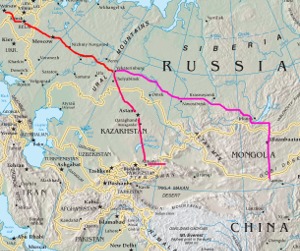 The well-known way of getting from Europe to China overland is the transsiberian railway. However, I noted that the route through Kazakhstan I took is the quickest way to get to China by train and bus. I thought I'd write that up:
The well-known way of getting from Europe to China overland is the transsiberian railway. However, I noted that the route through Kazakhstan I took is the quickest way to get to China by train and bus. I thought I'd write that up:- Take train EC 43 from Berlin Hauptbahnhof (09:37 on Monday, Berlin time) to Warsaw Wschodnia, change to train D 10SZ (15:28). If you - like me - feel that the time to switch trains is a bit risky in case of delaqys, you can take the earlier Beriln-Warsaw-train EC 41 (06:37 until 12:08). There's also a direct Berlin-Moscow-train D 50472 (Berlin 04:28, Moskwa Belorusskaja 10:33), but it's often sold out early.
- Spend some time in Moscow and then take the Metro Line 5 (Circular Line) to Komsol'skaya (Metro of Kazasky railway station)
- Take train 090У from Moscow Kazansky (18:48 on Tuesday, Moscow time) to Petropavl/Petropavlovsk in Kazakhstan (09:46 on Thursday, Astana/Almaty time). Note that this only works every second Tuesday - you may choose other days where this train goes, but then other options may not work.
- Take train 152T from Petropavl (13:48 on Thursday, Astana/Almaty time) to Almaty (22:28 on Friday, Astana/Almaty time).
- Take bus number 100 to Sayran bus station and hope that they'll sell you a ticket late in the evening for the bus next morning. Find a place to sleep (but not very long).
- Take bus from Astana Sayran bus station (07:00 on Friday, Astana/Almaty time) to Yining (approx. 21:00 on Friday, Beijing time). You're in China.
With the transsiberian, you can leave Berlin on Monday (same options as above until Moscow) and take the D4ZJ direct train from Moscow to Beijing. You will enter China in Erlian on the next Monday at 00:47. So this makes almost 7 days vs. about 4 and a half days.
I wouldn't recommend anyone doing that. Better spend some time on the way and see some places in Russia or Kazakhstan. Also it should be noted that one obvious reason for being faster is that you'll enter China at a place much further in the west. And getting to the main part of china (the western part is much less inhabited than the eastern part and all big cities are in the east) can be somewhat troublesome. Still, I thought it might be of interest to document the fastest overland way from Europe to China.
I always assumed the starting point Berlin, obviously because I live there, adapting that to other starting places should be trivial. For example you can usually easily (and for a comparatively cheap price) reach Berlin by Eurolines bus in a day from other major european cities like Paris or London.
Saturday, December 7. 2013
Xi'an, capsule hostel, chinese pyramids and more
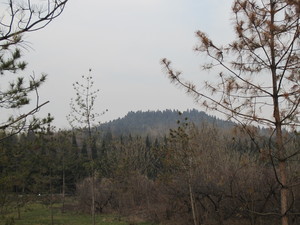
The great pyramid of China (I admin it doesn't look that spectacular and pyramid-like)
Between Dunhuang and Lanzhou, I took what is called the "hard seat" class for a 14 hour ride (not overnight). I can quote Wikivoyage on that:
"Traveling in a seat (hard or soft-class) means you will share the car space with lots of locals. You will most likely encounter smokers, loud noise, and constant activity in the aisle while you try to sleep. *Do not* travel hard class if you are uncomfortable with these settings."
While I certainly was an interesting experience, it is not exactly one I'd like to repeat. It was challenging and I was quite happy when I finally arrived.
With my arrival in Xi'an, finally I noticed that I approach the warmer zones of China. While not really "summer-warm", I apprechiated not having to wear winter clothes all the time. Appart from that, Xi'an was quite different from the other cities I've visited before. It is in many small ways much more like a western city (and, to be not mistaken, in many ways this is a good thing - better hygiene, less dangerous traffic, no smoking in non-smoking zones). And regarding my last blog post, yes, coffee is usually available, although often expensive.
Xi'an is also home of one of Chinas most popular tourist attractions, the so-called terracotta warriors and - not that well known - the Chinese pyramids. I didn't know that there are pyramids in China, so found that worth seeing. Unlike pyramids in other places of the world, the chinese pyramids are not buildings, they are artificial hills. The biggest one, near the terracotta warriors, is the mausoleum of Chinas first emperor Qin Shi Huang.
My initial plan was to visit the pyramid and then decide if I still had time and motivation to see the terracotta warriors. I took the bus to the terracotta warriors and walked the roughly two kilometers to the pyramid. Turned out my planning was not really how one was supposed to do things. Going to the pyramid is only possible with an entrance ticket for the terracotta warrior museum - and you cannot buy it at the entrance of the pyramid area. There's a free shuttle service which I then took to get the ticket and drive back.
The pyramid doesn't look that spectacular and there's hardly a spot where you can actually see it's a pyramid. It once was much bigger, but during the centuries, the earth got compressed and it became smaller. I walked around a lot, the area around is a nice park.
As it is common amongst tourist destinations probably everywhere in the world, there is a huge amount of people who want to sell you things - from terracotta warrior replica in all sizes (including ones in original size and made mostly out of the same materials than the original ones) to the various tour guides. I refused all these offers and preferred to find my own way. One more thing notable: This isn't mainly a tourist spot for foreign tourist. The vast majority were domestic tourists.
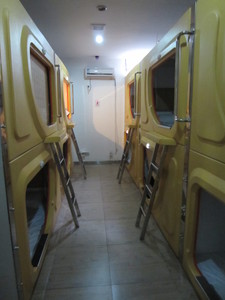
Capsule Hotel in Xi'an
While writing this, I'm in the highspeed train from Xi'an to Guangzhou (taking only 8 hours). I've been to Guangzhou before, and I'm not going there not mainly because I want to see something there. I have a double-entry 2 x 30 days visa and from Guangzhou, I intend to make a quick hop to Hong Kong. Although part of China, in visa issues Hong Kong is like going to another country. So by going to Hong Kong, I have another 30 days to spend in China. Arriving in Guangzhou, I can also finally leave any traces of the northern hemisphere winter behind myself. It has comfortable temperatures all year round.
Pictures from Xian
Pictures from Guangzhou
Posted by Hanno Böck
in English, Life
at
04:06
| Comments (0)
| Trackbacks (0)
Defined tags for this entry: asia, asia2013, capsulehotel, china, pyramid, terracottawarriors, train, xian
Monday, December 2. 2013
No coffee in northwest China
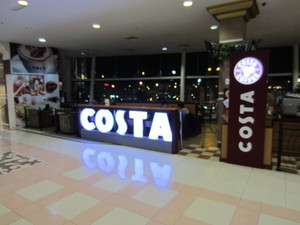
Costa Coffee is expanding to Asia - this one's in Astana
When travelling, I usually have my own coffee making equipment, which consists of a couple of coffee filters, a collapsable filter holder, some coffee powder and some coffee creamer powder (which doesn't make a very delicious coffee and I prefer real milk or soy milk if possible, but it's a reasonable compromise when travelling).
I was running out of coffee powder shortly after I entered China. I really hadn't expected that it would be a problem. After all, the biggest international coffee chains, Starbucks and Costa Coffee, are flooding eastern and southern China with their restaurants and Chinese chains and independent coffee houses are trying to keep up with that. Well, the problem is that I entered China in the far northwest. And the Chinese love for coffee hasn't made it there yet.
I could hardly believe this, but between Yining and Dunhuang, I didn't find any coffee. None at all. Not in the form of coffee powder and not in brewed form. Yeah, supermarkets have a large collection of soluble instant coffee, most of it Nescafe and also some Chinese brands. But I refuse to call that stuff coffee. Most of it contains more sugar than anything else. When you get coffee in restaurants at all, you can bet it's also instant coffee. I checked where the next Starbucks is: In Xi'an, thousands of kilometers away. I checked for the next Costa Coffee: Also in Xi'an. (I'm on my way to Xi'an now - no, not just because of the coffee, it was my plan anyway.)
After all, I bought some non-sugared instant coffee. No, I wasn't happy with it, but it seemed it was the best I could get.
Lesson learned: There's just no coffee in northwest China.
Saturday, November 30. 2013
Through Western China and no train tickets from Urumqi
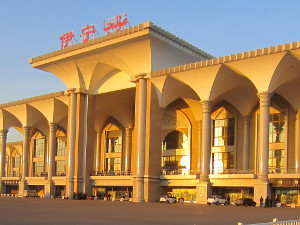
Train station in Yining
I took the train from Yining to Urumqi. My original plan was to move along quite fast and directly take the next train to Xi'an. But that didn't really work. I had to find out that all train tickets for the upcoming days to every location east of Urumqi were sold out. This was kind of a déjà vu. Last time I was in China I had the plan to travel this way in the other direction - and no tickets were available. Reading local news, this situation might improve 2014, when a new highspeed train line opens between Urumqi and Lanzhou. I didn't want to wait that long though.
However, this time I knew that there are alternatives - by taking the bus. I took a bus to the town Dunhuang, which is about 1,000 kilometers east of Urumqi.
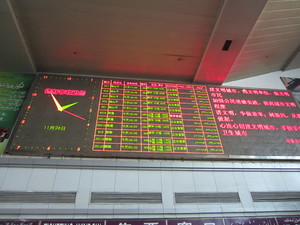
Bus times in Urumqi
The bus trip through the Xinjiang desert passed a lot of wind turbines. While China is often portrayed as the environmental bad guy, one shouldn't fail to recognize that it's also the world leader in building renewable energies. However, the many Xinjiang wind turbine fields also told the other not so green side of the Chinese renewable boom: Many of the turbines were just standing still. The most likely reason: China is building up wind power faster than it's caring for grid integration. I'm used to that look in Germany - wind power there is also often downregulated, because grid integration is not keeping up with the installation of new wind energy. But it was quite obvious that this problem is far bigger here in China's desert.
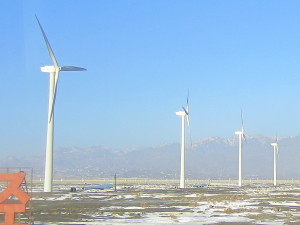
Wind energy in Xinjiang
Tomorrow I'll take the train to Lanzhou.
Pictures from Yining
Pictures from Dunhuang
Pictures from wind power turbines in the Xinjiang province
Pictures from Lanzhou
Tuesday, November 26. 2013
By Bus from Almaty/Kazakhstan to Yining/China
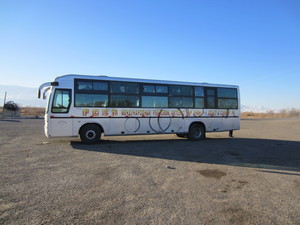
Our bus
I read at some places about a different possibility: A bus service from Almaty to Yining (伊宁 which, to make things complicated, has also a kazakh/uighur name - Kulja / Құлжа / قۇلجا - which, to make things even more complicated, can be written in many different ways using latin characters, cyrillic characters or arabic characters). The information was quite scarce. I basically only had a few forum entries mentioning it, so all the information I had seemed quite unreliable. And even the guy from the hostel where I stayed didn't know more.
I could find out that there's an international bus station in Almaty called Sayran (сайран). It is located somewhat outside the city and can be reached with bus number 100 from the Almaty 2 train station. I went there on Thursday and - although without language communication possible - could tell them what I wanted. They wrote me down a date and time for the next bus: Saturday at seven in the morning. Sadly, I didn't find out how often this bus goes. Saturday was fine for me so I bought my ticket for the bus.
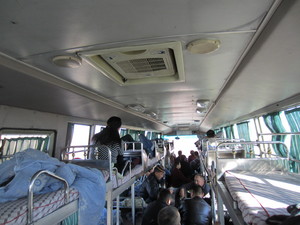
Beds and most people sitting on the floor
We spend about an hour at a restaurant in the middle of the desert and also some time at the border. I was a bit worried about the border crossing, because recently there have been some conflicts in the Xinjiang province, which is the chinese province you enter when coming from Kazakhstan. But at the border everything was fine, except that my border crossing took a bit longer than the others.
Right behind the border a lot of people were trying to offer money exchange. I didn't do that, because at such points you usually don't get the best exchange rates, which later turned out to be a mistake. It seems not exactly easy to change Tenge into Renminbi in Yining and as I'm writing this, I still have some Kazakh money with me after having tried to exchange it in three different banks in Yining.
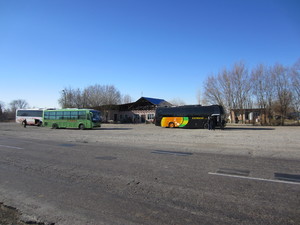
Lunch break in the desert - this really felt like being in the middle of nowhere
Hopefully this information will provide other travellers some help when they try to take this bus. To recap the important information:
- Bus from Almaty to Yining starts at Sayran bus station (reachable via local bus 100 from Almaty 2 train station).
- Runs at 07:00 a.m. on unknown weekdays, but due to my experiences probably on fridays and not on thursdays (If you have any info on that, e. g. a link to the bus company, please add it in the comments).
- Costs 4600 Tenge (thats about 21 € or 30 US$).
- Takes about 12 hours.
- Crosses border to China at Khorgas (霍尔果斯 in mandarin chinese, قورعاس in uighur, Хоргос in russian and Қорғас in kazakh language).
Pictures from bus trip
Tuesday, November 12. 2013
Travelling again
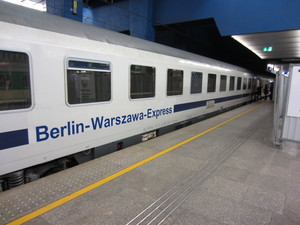 If you've been reading my blog back in 2011, you'll remember that I did a two-month-long trip on the transsiberian railway through Russia, Mongolia and China. Ever since the idea was in my head that I wanted to do something alike again.
If you've been reading my blog back in 2011, you'll remember that I did a two-month-long trip on the transsiberian railway through Russia, Mongolia and China. Ever since the idea was in my head that I wanted to do something alike again.So today I am starting a new journey to Asia, again mostly by train. Slightly modified from last time, as I don't need to see all the places again I've already been. I started today at 6 am in Berlin and I'm currently in Warsaw, Poland (where the 19th world climate conference is just starting, but that's purely a coincidence). I'll only spend a couple of hours in Warsaw and then will continue my trip to Moscow. From there, I'll head on to Kazakhstan and later to China. If everything works out as intended, I'll hopefully spend parts of the winter in warm and sunny areas.
I make no promises, but I'll try to keep my blog updated with pictures and events happening on my trip.
Technical note: All entries related to this trip will be marked with the tag asia2013. All entries related to my previous trip to asia can be found under the tag trip2011. Pictures will be collected here.
Friday, November 9. 2012
Languages and translation technology
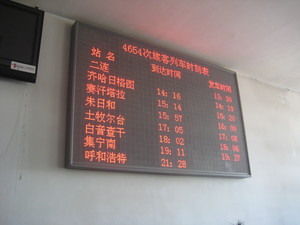 Just recently, Microsoft research has made some progress in developing a device to do live translations from English into Mandarin. I'd like to share some thoughts with you about that.
Just recently, Microsoft research has made some progress in developing a device to do live translations from English into Mandarin. I'd like to share some thoughts with you about that.If you read my blog on a regular basis, you will know that I traveled through Russia, Mongolia and China last year. If there's one big thing I learned on this trip, it's this: English language is - on a worldwide scale - much less prevalent than I thought. Call me a fool, but I just wasn't aware of that. I thought, okay, maybe many people won't understand English, but at least I'll always be able to find someone nearby who's able to translate. That just wasn't the case. I spent days in cities where I met nobody that shared any language knowledge with me.
I'm pretty sure that translation technologies will become really important in the not-so-distant future. For many people, they already are. I've learned about the opinions of swedish initiatives without any knowledge of swedish just by using Google translate. Google Chrome and the free variant Chromium show directly the option to send something through Google translate if it detects that it's not in your language (although that wasn't working with Mongolian when I was there last year). I was in hotels where the staff pointed me to their PC with an instance of Yandex translate or Baidu translate where I should type in my questions in English (Yandex is something like the russian Google, Baidu is something like the chinese Google). Despite all the shortcomings of today's translation services, people use them to circumvent language barriers.
Young people in those countries are often learning English today, but it's a matter of fact that this will only very slowly translate into a real change. Lots of barriers exist. Many countries have their own language and another language that's used as the "international communication language" that's not English. For example, you'll probably get along pretty well in most post-soviet countries with Russian, no matter if the countries have their own native language or not. This also happens in single countries with more than one language. People have their native language and learn the countries language as their first foreign language.
Some people think their language is especially important and this stops the adoption of English (France is especially known for that). Some people have the strange idea that supporting English language knowledge is equivalent to supporting US politics and therefore oppose it.
Yes, one can try to learn more languages (I'm trying it with Mandarin myself and if I'll ever feel I can try a fourth language it'll probably be Russian), but if you look on the world scale, it's a loosing battle. To get along worldwide, you'd probably have to learn at least five languages. If you are fluent in English, Mandarin, Russian, Arabic and Spanish, you're probably quite good, but I doubt there are many people on this planet able to do that. If you're one of them, you have my deepest respect (please leave a comment if you are).
If you'd pick two completely random people of the world population, it's quite likely that they don't share a common language.
I see no reason in principle why technology can't solve that. We're probably far away from a StarTrek-alike universal translator and sadly evolution hasn't brought us the Babelfish yet, but I'm pretty confident that we will see rapid improvements in this area and that will change a lot. This may sound somewhat pathetic, but I think this could be a crucial issue in fixing some of the big problems of our world - hate, racism, war. It's just plain simple: If you have friends in China, you're less likely to think that "the chinese people are bad" (I'm using this example because I feel this thought is especially prevalent amongst the left-alternative people who would never admit any racist thoughts - but that's probably a topic for a blog entry on its own). If you have friends in Iran, you're less likely to support your country fighting a war against Iran. But having friends requires being able to communicate with them. Being able to have friends without the necessity of a common language is a fascinating thought to me.
Posted by Hanno Böck
in Computer culture, English, Life
at
22:53
| Comments (0)
| Trackbacks (0)
Defined tags for this entry: babelfish, china, chinese, english, googletranslate, language, mandarin, russia, russian, translation, travel, universaltranslator
Friday, July 29. 2011
Behind the great firewall
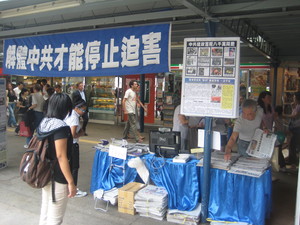 When thinking about China, probably many people associate this with censorship.
When thinking about China, probably many people associate this with censorship.On my trip, I had the chance to see the infamous great firewall from the inside. I haven't done any deeper analysis, but I'll share some thinkgs I've observed. A couple of famous sites (for example Twitter, Flickr) are blocked. Contrary to what many people may believe, webpages that are often associated with Warez (Rapidshare, Pirate Bay) were also blocked. The situation with Wikipedia was mixed. Most of the time, I could read the texts on Wikipedia, but access to the image servers was blocked. At the end of our trip, I couldn't access Wikipedia any more.
I encountered no blocks on less famous sites, although I regularly surf sites that could be labelled politically controversial. Though this probably doesn't tell much, except that the chinese authorities are not very interested in blocking european websites.
Interesting may be that the blocking works on an IP level. DNS resolution of blocked sites still works, but you cannot ping the IPs. I haven't extensively tried to circumvent the censorship, as I had no pressing need for it. The only thing I tried was an SSH tunnel, but that usually wasn't possible as the connection never was fast and reliable enough for a stable SSH session.
Most Hotels and Hostels provide Internet access - but most of them by cable. Usually, in other countries today this is done via wireless lan. My theory on that is that a cable-based Internet access makes it easier to log activity associated to a specific person (you always have to show your passport when you check into a Hotel). But still, we had anonymous Internet access (both wireless and cable) at a few places.
Another thing I'd like to mention is what the (non-technical) censorship did with me. I knew that in China people cannot just write a blog, they need some kind of license for it. I was very unsure what this means for me as a forein traveller. I came to the conclusion that I likely won't get any trouble if I just write about my trip without touching any controversial topics. Although I hadn't planned to write anything, this was always in my mind and probably influenced my writings. There was one time where I self-censored myself. In the entry about Hong Kong, I originally had this part, which I removed before publishing:
Most notably it is a place where free speech is possible to a much higher degree than in mainland China. This makes it a very important place for political discussion about China in general. We saw chinese dissident groups that had their information tables and spread leaflets around the Kowloon harbour.
Not much and I luckily have the opportunity to publish it now.
Posted by Hanno Böck
in English, Life, Politics
at
11:46
| Comment (1)
| Trackbacks (0)
Defined tags for this entry: asia, censorship, china, greatfirewall, hongkong, travel, trip2011, zensur
Sunday, July 17. 2011
Alternative routes through Kazakhstan
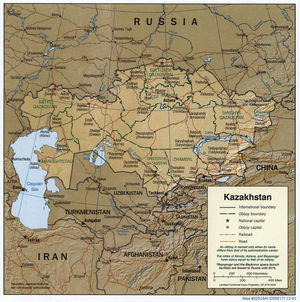 I have promised to write something about the route we had planned to take for the way back from China to Europe. We had several variants in mind, I'll list them all. All of them, however, have in common that they start in Ürümqi (乌鲁木齐, ئۈرۈمچی) - and as I already wrote, the train line to Ürümqi seems to be a bottleneck - it was booked out for an unknown amount of time.
I have promised to write something about the route we had planned to take for the way back from China to Europe. We had several variants in mind, I'll list them all. All of them, however, have in common that they start in Ürümqi (乌鲁木齐, ئۈرۈمچی) - and as I already wrote, the train line to Ürümqi seems to be a bottleneck - it was booked out for an unknown amount of time.Ürümqi is a town in the Uyghur province of China in the north-west. It is north of the Taklamakan desert. China's population is not evenly spread through the country. Most of the population lives in the eastern part. The west is sparsely populated and Ürümqi is one of the very few big cities in the west.
From Ürümqi, there are several options to go to Kazakhstan - there exist trains and busses both to Astana (Астана, أستانا), the current capital of Kazakhstan, and Almaty (Алматы, الماتى), the former capital.
Variant a: Twice through russia (our preferred option).
From Astana, there is a train directly to Kiev (Київ) in Ukraine. The train goes twice through russia. Once it scratches it before Oral / Uralsk (Орал). I think it doesn't even stop there. The other time it goes through the Caucasus region.
It should've been possible to buy the train ticket in Astana and then get a transit express visa in the russian consulate. I read some reports suggesting that EU people were able to do this. However, I was not entirely sure about that: Usually, a russian transit visa only allows to pass the country a single time. I don't know if crossing the country twice would've posed any problems.
Astana to Kiev is quite long - stopping was a problem, because you can only get the transit visa once you have the ticket for the whole journey. So our plan was to take the train just to Kharkiv (Харків) in the east of Ukraine. This would've limited the train trip to a bit more than two days. Still a lot, but acceptable for me.
Variant b: Once through russia.
Oral/Uralsk (Орал) in western Kazakhstan has its own russian embassy. As stated above, the train from Astana to Oral already crosses russia, but there's a way round: One can first take the train to Atyrau (Атырау) and then to Oral. This way, you don't leave Kazakhstan. The advantage: Lots of options to make stops, no overly long train trips.
The problem with this variant was that I had almost no information about the consulate in Oral: I haven't read a single report online that any EU citizen tried or successfully applied for a transit visa there. I only found some people asking that question, but without answers. So it was quite unsure if this would work.
Variant c: Avoiding russia altogether (option we originally intended to take).
It is also possible to avoid passing russia altogether. One can go by train to Atyrau (like in variant b), but then take a train on to Aktau (Ақтау) at the caspian see. From Aktau, there is a ferry service to Baku in Azerbaijan.
Now, this "ferry" has its own problems: It has no regular schedule. In fact, from what I read its no real ferry at all, but a cargo ship. It starts when there's enough cargo. So you have to get there and ask every day if there will be a ship today. Waiting times rank between some days and two weeks. I had liked to take that option, because I like travelling by ship and I thought that sounded like an interesting experience.
From Azerbaijan, one could take a train to Tbilis in Georgia and continue by bus to Istanbul in Turkey. From there, there is a train to Austria (the orient express sadly doesn't exist any more).
We had our visas ready for Kazakhstan and Azerbaijan. Georgia and Turkey are visa free for EU citizens.
If you look at a map, you may notice that there's another option: Going from Kazakhstan to Turkmenistan and Iran. However, that would've imposed getting two more visa plus the feeling that travelling through Iran might be a risk. So I haven't really investigated that option very much.
Posted by Hanno Böck
in English, Life
at
22:30
| Comments (0)
| Trackbacks (0)
Defined tags for this entry: asia, azerbaijan, caspian, china, ferry, kazakhstan, russia, travel, trip2011, visa
Friday, July 15. 2011
Visa
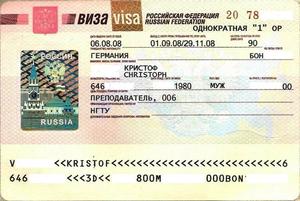 For our trip, we needed a couple of visa. I haven't applied myself for a visa any time before, so this was quite new to me. This was the most troublesome part of our travel preparations.
For our trip, we needed a couple of visa. I haven't applied myself for a visa any time before, so this was quite new to me. This was the most troublesome part of our travel preparations.What I learned about getting visa:
- Every country has different rules for visa.
- You cannot apply for several visa at once - they take your passport. That means you have to add all the waiting times and cannot apply for more than one at once (this may seem trivial if you know the procedure, but I didn't).
- The information on the consulates webpages is often incomplete or inaccurate. (For example, if you have a 30 day visa: Does that mean 30 days starting from your entry to the country? Or 30 days starting from a fixed date you have to know in advance? Pretty relevant if you plan your trip.)
- If you phone a consulate, they won't answer. If you email a consulate, they won't answer.
- You cannot expect that anyone in the consulate is able to speak to you in a language you understand.
- You cannot expect that information you got from people in the consulate is correct.
- Usually, the best way to get information is searching the internet for people who have done the same thing before. There are specialized companies that arrange your visa, but the information you get from them is also often inaccurate.
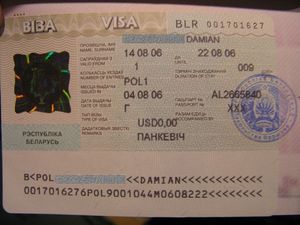 In the end, we applied for 6 different visa (Russia, Mongolia, Belarus, China, Kazakhstan, Azerbaijan), although we didn't use them all in the end (see previous blog entry).
In the end, we applied for 6 different visa (Russia, Mongolia, Belarus, China, Kazakhstan, Azerbaijan), although we didn't use them all in the end (see previous blog entry).The most difficult part was the russian one. That was, in the end, the reason we couldn't make the trip the way we wanted to (taking the transsiberian train for both directions with stops). They have a kind of bizzare regulation regarding invitations: You need an invitation to apply for a russian tourist visa. This has evolved a market for agencies that arrange invitations. That means you pay them that they do a fake booking in a hotel you will never see in reality and get an invitation from them.
Another anecdote: When asking for the "two-way"-problem in the embassy, they gave us a contact to a travel agency that will help us. This travel agency suggested we could get two passports and thus apply for two visa - that would've been illegal according to russian law. I had no intention in seeing a russian jail from inside, so I refused to choose that option.
You see, it's a pretty complex issue. But there's one thing one should mention, too: It's not the russian (or other countries) authorities that are to blame here. Russia is very willing to relax its visa rules. They even suggested several times to abbadon the visa requirement for EU citizens at all. They just have one requirement: The regulation should be relaxed for their citizens, too. Everything I've heared suggests that russians trying to get a visa for Germany and other EU countries face more difficulties than the other way round. It's the EU that is blocking here.
If you want visa regulations to be relaxed, you'd better not only blame other countries regulations. You should also ask how regulation is the other way round. Looking at the current political debate in the EU, I don't have much hope that the situation will improve soon.
(the pictures are from Wikimedia Commons here (Russia) and here (Belarus) and are public domain)
Posted by Hanno Böck
in English, Gentoo, Politics
at
22:56
| Comments (5)
| Trackbacks (0)
Defined tags for this entry: asia, azerbaijan, belarus, china, kazakhstan, mongolia, russia, travel, trip2011, visa
Wednesday, July 13. 2011
Unexpected difficulties on our trip
My Asia trip is over. I'll try to sum up some experiences I made.
In the end, we couldn't do a lot of things we had planned to do, especially for the China part of our trip. Due to a number of reasons, our approximate time plan completely didn't work. Sometimes this was due to a lack of information (e. g. not finding a ferry / a bus we've read about) and communication possibilities. A surprising problem was also the lack of internet information: It seems having a webpage is far less common in China, many transport operators, hotels or other venues had no internet presence at all, not even a chinese one.
Very time consuming were unplanned stops due to simple health problems like a cold.
I think I wrote that some times before, but I had never expected the difficulties with the language. The idea that English is some kind of "international communication language" is not very common in Russia and China - I think we stayed in a couple of cities where we didn't meet a single person we could talk to. I felt this was a great limitation for my possibilities to get to know those countries better.
Another unexpected difficulty was getting any medicine. I had thought that in any country in the world you should be able to get some equivalent medicine if you show the pharmacy personal the scientific name of the ingredient. This worked in Russia, but it didn't work in China - and I tried a lot of pharmacies. I suggest if you ever go to China, take everything you usually use to handle small issues like a cold or a headacke in large enough quantities.
In the preparation phase of the trip, I was often warned of safety issues like pickpocketing. This was almost a non-issue. Nothing was stolen from me and I don't remember even an attempt to do so, although we visited places like the Naran Tuul market in Ulaanbaatar, where everyone will tell you that pickpocketing is a big issue. I don't know if I was just lucky, but I had the feeling that using common sense and always looking after your belongings is enough to handle this.
In the end, we couldn't do a lot of things we had planned to do, especially for the China part of our trip. Due to a number of reasons, our approximate time plan completely didn't work. Sometimes this was due to a lack of information (e. g. not finding a ferry / a bus we've read about) and communication possibilities. A surprising problem was also the lack of internet information: It seems having a webpage is far less common in China, many transport operators, hotels or other venues had no internet presence at all, not even a chinese one.
Very time consuming were unplanned stops due to simple health problems like a cold.
I think I wrote that some times before, but I had never expected the difficulties with the language. The idea that English is some kind of "international communication language" is not very common in Russia and China - I think we stayed in a couple of cities where we didn't meet a single person we could talk to. I felt this was a great limitation for my possibilities to get to know those countries better.
Another unexpected difficulty was getting any medicine. I had thought that in any country in the world you should be able to get some equivalent medicine if you show the pharmacy personal the scientific name of the ingredient. This worked in Russia, but it didn't work in China - and I tried a lot of pharmacies. I suggest if you ever go to China, take everything you usually use to handle small issues like a cold or a headacke in large enough quantities.
In the preparation phase of the trip, I was often warned of safety issues like pickpocketing. This was almost a non-issue. Nothing was stolen from me and I don't remember even an attempt to do so, although we visited places like the Naran Tuul market in Ulaanbaatar, where everyone will tell you that pickpocketing is a big issue. I don't know if I was just lucky, but I had the feeling that using common sense and always looking after your belongings is enough to handle this.
Tuesday, July 12. 2011
Travelling without flying - how I failed
I haven't stepped into an airplane for about 12 years. I travelled a lot through Europe with ferries, trains, busses and hitchhiking. It was my plan to stick to that on this big trip.
It's a simple fact that there is no viable option to use airplanes on a regular basis in a responsible way. There is no thinkable way that all humans on this planet can have access to planes. It only works because it's a privilege of a rich minority. And there's no thinkable way of combating climate change with the current growth rate of the aviation industry - not to mention the dangers of Peak Oil and unconventional oil extraction.
Some environmentalists who like flying found a very creative way to circumwent this: Compensating emissions. You pay an amount of money that's invested in some climate project for every flight you do. If I had to name the three most ridiculous actions people invented in combating climate change, compensating flight emissions would certainly rank amongst them (for the other two I'd vote carrot mobs and lights off actions). As above, this only works for a very small minority of rich people.
Ok, so back to our trip. It was my plan to avoid flying. I wanted to proove myself and others that it's possible. I failed. I took a plane from Beijing back to Germany. For a relatively trivial reason: Our plan was to take a train to Urumqi, then go to Kazakhstan and then we had two options, one with a train through russia to Ukraine and one through the caspian see to Azerbaijan (I will describe those in detail in a later blog entry). All of them requried getting to Urumqi first. There's no alternative route with public transport. And here's the problem: All tickets to Urumqi were sold out - for the whole time they can be booked in advance. So we wouldn't get tickets for an unknown amount of time.
I the end, after checking all alternative options I could think of, I decided to take a plane back to Germany and shorten my trip. I wasn't that unhappy about it after all, because I experienced our trip much more exhausting than imagined.
There would've been one other option: Taking the transsiberian train back. But that imposes another difficulty that has to do with russias visa regulation. A russian tourist visa is valid for 30 days. So ours is expired. It is not possible to get two visa at the same time, so it was not possible to arrange this in advance (it was our original plan to go back through Russia). And it is not possible to get a russian tourist visa anywhere else than in your home country. It used to be possible in Hong Kong in the past, but recently russia has tightened its visa regulations and according to several online sources this is no longer the case. The only option is getting a Russian transit visa. But that means you have to do the whole trip in a row and have all the tickets to Moscow and further to another country ready beforehand. This means several days in a train without much possibility to pause. I decided that I'm not up for that. I already found the many long train trips we did very difficult, partly because I'm slightly claustrophobic. My girlfriend will do the train trip - I won't. If you are ever in the same situation and need a travel agency, I can suggest Monkey Shrine - they are quite expensive, but their service was excellent. They were able to arrange all tickets including ones from Moscow to Kiev or Tallin and offered a lot of different options for all parts of the trip.
Now I don't think that my single flight will change much. It was a symbolic thing. But I think that opening options for flightless travelling is essential and gets far too less attention. If people talk about environmental or sustainable tourism, the issue of aviation is rarely spoken about. Often enough the problem is just that it is never considered. Take the visa regulation: If you enter and leave a country with an airplane, you usually don't need any visa - even if you change the plane within the country. There's no comparable rule for trains. You even need a visa if you enter and leave a country in a train without a stop. If you're looking for organized transsiberian railway trips, almost all the time it's taking the train for one direction and the plane for the other. Different public transport options often don't fit very well together. I always illustrate this with an experience I had last year when I switched from the train in Zeebrugge in Belgium to the ferry to Edinburgh - there was not any proper footpath from the train to the ferry, although they were only some dozent meters apart. You had to either illegally cross the railway lines or walk on a big street without a footway. I think many missing links for travel options could be closed if there would be more people doing it (e. g. there is no ferry from Singapoure or other Asian countries to Australia and none between Russia and Alaska, although the way isn't that far).
These are just some unfinished thoughts, but I could imagine there is a need for a lobby for flightless travelling. There's much more one could write about it. Flightless travelling means slower travelling - which brings up a discussion about our relation to working time.
If you're interested in flightless travelling, the best online ressource I found is the great webpage seat61.
My trip ends here, but some more blog entries will follow with stuff I didn't find the time yet to write down.
It's a simple fact that there is no viable option to use airplanes on a regular basis in a responsible way. There is no thinkable way that all humans on this planet can have access to planes. It only works because it's a privilege of a rich minority. And there's no thinkable way of combating climate change with the current growth rate of the aviation industry - not to mention the dangers of Peak Oil and unconventional oil extraction.
Some environmentalists who like flying found a very creative way to circumwent this: Compensating emissions. You pay an amount of money that's invested in some climate project for every flight you do. If I had to name the three most ridiculous actions people invented in combating climate change, compensating flight emissions would certainly rank amongst them (for the other two I'd vote carrot mobs and lights off actions). As above, this only works for a very small minority of rich people.
Ok, so back to our trip. It was my plan to avoid flying. I wanted to proove myself and others that it's possible. I failed. I took a plane from Beijing back to Germany. For a relatively trivial reason: Our plan was to take a train to Urumqi, then go to Kazakhstan and then we had two options, one with a train through russia to Ukraine and one through the caspian see to Azerbaijan (I will describe those in detail in a later blog entry). All of them requried getting to Urumqi first. There's no alternative route with public transport. And here's the problem: All tickets to Urumqi were sold out - for the whole time they can be booked in advance. So we wouldn't get tickets for an unknown amount of time.
I the end, after checking all alternative options I could think of, I decided to take a plane back to Germany and shorten my trip. I wasn't that unhappy about it after all, because I experienced our trip much more exhausting than imagined.
There would've been one other option: Taking the transsiberian train back. But that imposes another difficulty that has to do with russias visa regulation. A russian tourist visa is valid for 30 days. So ours is expired. It is not possible to get two visa at the same time, so it was not possible to arrange this in advance (it was our original plan to go back through Russia). And it is not possible to get a russian tourist visa anywhere else than in your home country. It used to be possible in Hong Kong in the past, but recently russia has tightened its visa regulations and according to several online sources this is no longer the case. The only option is getting a Russian transit visa. But that means you have to do the whole trip in a row and have all the tickets to Moscow and further to another country ready beforehand. This means several days in a train without much possibility to pause. I decided that I'm not up for that. I already found the many long train trips we did very difficult, partly because I'm slightly claustrophobic. My girlfriend will do the train trip - I won't. If you are ever in the same situation and need a travel agency, I can suggest Monkey Shrine - they are quite expensive, but their service was excellent. They were able to arrange all tickets including ones from Moscow to Kiev or Tallin and offered a lot of different options for all parts of the trip.
Now I don't think that my single flight will change much. It was a symbolic thing. But I think that opening options for flightless travelling is essential and gets far too less attention. If people talk about environmental or sustainable tourism, the issue of aviation is rarely spoken about. Often enough the problem is just that it is never considered. Take the visa regulation: If you enter and leave a country with an airplane, you usually don't need any visa - even if you change the plane within the country. There's no comparable rule for trains. You even need a visa if you enter and leave a country in a train without a stop. If you're looking for organized transsiberian railway trips, almost all the time it's taking the train for one direction and the plane for the other. Different public transport options often don't fit very well together. I always illustrate this with an experience I had last year when I switched from the train in Zeebrugge in Belgium to the ferry to Edinburgh - there was not any proper footpath from the train to the ferry, although they were only some dozent meters apart. You had to either illegally cross the railway lines or walk on a big street without a footway. I think many missing links for travel options could be closed if there would be more people doing it (e. g. there is no ferry from Singapoure or other Asian countries to Australia and none between Russia and Alaska, although the way isn't that far).
These are just some unfinished thoughts, but I could imagine there is a need for a lobby for flightless travelling. There's much more one could write about it. Flightless travelling means slower travelling - which brings up a discussion about our relation to working time.
If you're interested in flightless travelling, the best online ressource I found is the great webpage seat61.
My trip ends here, but some more blog entries will follow with stuff I didn't find the time yet to write down.
Sunday, July 10. 2011
Welcome to Fake Disneyland
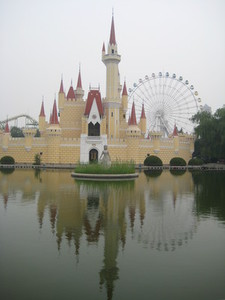 Maybe you've heared that some years ago, a story about a fake Disneyland amusement park in China made some rumors in the media. As I love good fakes, I obviously had to take a look. The amusement park in question is Shijingshan Amusement Park ( 北京石景山游乐园) and is located in Beijing. It can easily be reached, as it has its own metro station.
Maybe you've heared that some years ago, a story about a fake Disneyland amusement park in China made some rumors in the media. As I love good fakes, I obviously had to take a look. The amusement park in question is Shijingshan Amusement Park ( 北京石景山游乐园) and is located in Beijing. It can easily be reached, as it has its own metro station.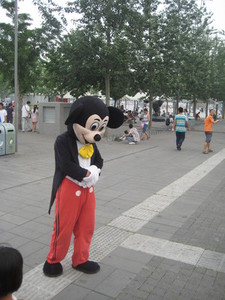 The park had the advertisement slogan "Disneyland is too far to go" some years ago and some images of Mickey Mouse and other Disney figures in the park boosted the story (see Wikipedia for details). Also, like all Disneylands, the Park has a Cinderella castle. It seems in the meantime things have changed - we didn't see any Disney charakters there. The only thing that still reminds of the story is the Cinderella castle - but as much as Disneys lawyers might want this, Cinderella is not a Disney invention after all.
The park had the advertisement slogan "Disneyland is too far to go" some years ago and some images of Mickey Mouse and other Disney figures in the park boosted the story (see Wikipedia for details). Also, like all Disneylands, the Park has a Cinderella castle. It seems in the meantime things have changed - we didn't see any Disney charakters there. The only thing that still reminds of the story is the Cinderella castle - but as much as Disneys lawyers might want this, Cinderella is not a Disney invention after all.I even found a fake Mickey Mouse (at least I think it was fake, it looked somehow wrong) in Beijing, but it was not in the amusement park, it was in the olympic village.
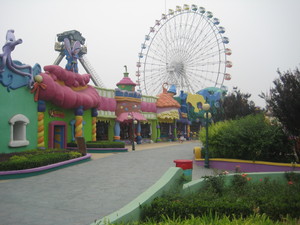 The story of a fake Disneyland seems highly exaggerated. The Cinderella is probably no issue at all, as I doubt there's anything that makes it a special "Disney-Cinderella". I'm not sure if there was a copyright violation at all: The fake Mickey Mouse and other figures in combination with the solgan could probably be considered parody - which is legally allowed in most of the world's copyright laws.
The story of a fake Disneyland seems highly exaggerated. The Cinderella is probably no issue at all, as I doubt there's anything that makes it a special "Disney-Cinderella". I'm not sure if there was a copyright violation at all: The fake Mickey Mouse and other figures in combination with the solgan could probably be considered parody - which is legally allowed in most of the world's copyright laws.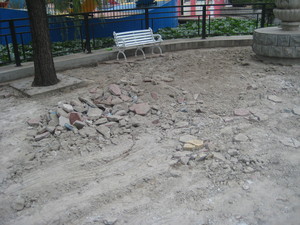 The park itself was kind of weird. Large parts of it were in really bad shape. Some looked like a construction site, many parts were not operational. On the other hand, other parts of it were really well-designed. One could hardly imagine that this was the same park.
The park itself was kind of weird. Large parts of it were in really bad shape. Some looked like a construction site, many parts were not operational. On the other hand, other parts of it were really well-designed. One could hardly imagine that this was the same park. A nice thing to mention: They had a dance dance revolution like arcade machine - but the game on it was StepMania - a free software game. I think this is the first time I saw a free software game in an arcade machine.
A nice thing to mention: They had a dance dance revolution like arcade machine - but the game on it was StepMania - a free software game. I think this is the first time I saw a free software game in an arcade machine.Unlike most european amusement parks, the pricing concept here is different - the entrance fee costs almost nothing (10 Yuan, approximately 1 €), but you pay for every ride.
Pictures from the park
Posted by Hanno Böck
in Copyright, English, Life
at
21:52
| Comments (0)
| Trackbacks (0)
Defined tags for this entry: amusementpark, asia, beijing, china, cinderella, copyright, disney, disneyland, fake, freesoftware, shijingshan, stepmania, travel, trip2011
(Page 1 of 2, totaling 25 entries)
» next page